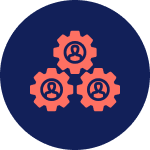The modern supply chain is riddled with challenges. As such, business leaders in logistics companies and organizations that depend heavily on reliable shipping and deliveries are looking for ways to minimize issues.
Since any difficulties tend to have a profound impact on the customer experience, optimizing communications processes to limit negative impressions is of utmost importance. Implementing an effective CRM in supply chain operations can help in this regard and that’s precisely the subject we will focus on today.
We’re going to discuss the role of a CRM in logistics and supply chain management, as well as go through the must-have features this type of solution should possess. Let’s get right into it.
How a CRM Benefits Supply Chain Management

CRM software is a great tool that effectively centralizes all client data, communication history, and related documents. Moreover, it helps automate sales, marketing, and customer support through personalized workflows that take repetitive tasks off your staff’s hands.
Read up on the 7 Key Benefits of a CRM
Whether you’re in charge of an entire logistics company or a supply chain management department within an organization, keeping track of customers is imperative. That’s the only way to deliver excellent service, surpass expectations, and ensure lasting business growth.
Logistics software development can be complex and there are a multitude of tools that companies operating in this sphere rely on. However, it’s important to note that a CRM platform is not the same as a supply chain management (SCM) solution. In fact, the two are often integrated to boost operations and streamline the supply chain management process. When a CRM and SCM work together, a truly 360-degree view of customers and communication efforts can be obtained.
Must-Have Features of a CRM in the Supply Chain
CRMs are powerful but only if they possess all the key functions a business may require. Below, we outline the five must-have features of a CRM you should be on the lookout for when eager to boost supply chain management productivity.
1. Full Customer View

As we’ve briefly mentioned, one of the most crucial functions of a CRM in supply chain operations is providing a full customer view. Simply put, the software needs to centralize all of the information your company has on the client. That way, employees can swiftly retrieve any details they require and nothing falls through the cracks.
It is imperative that the system automatically updates client profiles whenever a new interaction occurs or there is a change in circumstances.
For example, if a customer sends a text or rings the call center and says that there is an issue with a shipment — everything must be quickly recorded and appropriate action taken. As such, it’s a good idea to integrate your CRM with intelligent contact center platforms so that updates can occur automatically.
2. Contact Management

Managing contacts and keeping track of deals is another essential feature of any CRM within the supply chain sphere. Having everything in one place simplifies the work process and allows your team to capitalize on opportunities that may have otherwise gone unnoticed.
For example, if the customer service department and the sales team don’t exchange information, it’s harder to pinpoint each individual client’s or prospect’s needs and cater to them.
With a CRM, all relevant business areas are aware of any requests or issues that may have occurred. Thus, making the company better equipped to boost lead generation and customer service quality.
Learn how a CRM Improves Lead Generation
3. Reports and Analytics

Unsurprisingly, data analytics is an integral part of an effective supply chain and a useful CRM platform. After all, if you aren’t leveraging all of the centralized customer data to better understand the needs of clients, you’re truly missing out.
So, make sure that the platform you choose to implement can deliver extensive business intelligence and empower your team with client-related insights and logistics information.
This is crucial if any problems arise along the supply chain because by getting timely details and even forecasts, customer service will be able to notify clients and avoid unnecessary frustration. In short, all systems need to not only centralize data and work together but also run supply chain analytics that leverages all the relevant information the company has at its disposal.
4. Mobile App Version

It’s no news that everything is on mobile in the modern day. As such, your supply chain CRM needs to have a mobile app version to be truly useful.
You see, the supply chain has a lot of moving parts which may require employees from a range of departments to constantly be on-the-go. Having access to a CRM outside of an office and without having to get out a laptop can be particularly helpful in this case.
Discover how we developed a Mobile App for Inventory Management
5. Integration Capabilities

Lastly, when implementing a CRM in supply chain operations, it’s of utmost importance to think about its integration capabilities.
Concretely, check that the chosen CRM can integrate with SCM tools, document management software, ERP platforms, and even accounting solutions. Digital information should be synchronized between these technologies to deliver top-notch supply chain efficiency.
Take a look at how Velvetech How a CRM Can Help Streamline Your Sales Process
Time to Boost Your Customer Relationships
As you can see, there is a lot to think about when it comes to adding new technologies into your IT infrastructure. Nonetheless, implementing a CRM system for supply chain operations can offer a multitude of benefits to your company and as such, shouldn’t be overlooked.
If you’d like to know more about the way these tools improve customer relationships, don’t hesitate to reach out to our team. Velvetech has years of cross-industry expertise in implementing CRM solutions, and our specialists would be happy to help on your next project.









